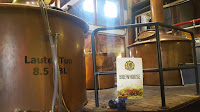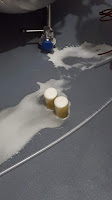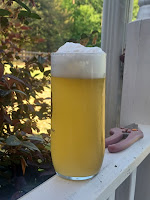I have long thought that the "Craft Beer™" industry's obsession with defining a craft brewery in terms that include elements of corporate structure is completely wrong headed. This thinking was validated last week by the speed with which the Brewers Association were letting the world know that Monster Beverage Corps purchase of, the frankly inanely monikered, CANarchy Craft Brewery Collective was 100% A OK with them and didn't mean the breweries lost the magical marketing cachet of "craft". It is almost enough to make me long for simpler times when a craft brewery had to be "small, independent, and traditional" to be in the club.
Thinking further on this, I wonder if making "traditional" the sacrificial lamb of the old description was likewise, wrong headed. I happily admit that the way "traditional" was defined back then was problematic, being:
"a brewer who has either an all malt flagship (the beer which represents the greatest volume among that brewers brands) or has at least 50% of its volume in either all malt beers or in beers which use adjuncts to enhance rather than lighten flavour".
As such, historic breweries like Schell's of Minnesota, and Pennsylvania's Yeungling were excluded from the club on the basis of having the wrong tradition. Anyone that knows the slightest thing about American brewing history will know that rice and corn found a home in American lager brewing because of the protein heavy worts that are a product of 6 row malt. These adjuncts weren't added to make beer cheaper or less flavourful, but to make it closer to what German immigrant communities were used to.
I actually kind of miss the days when "Craft Beer™" at least attempted to root itself in brewing history by encouraging tradition as a defining characteristic of craft beer. When I was at college, one of our professors spoke at length about the Greek word for tradition, "paradosis", which literally translates as things handed down from generation to generation. Tradition in brewing is not really about old ways of doing things but rather the collective wisdom of generations of craftspeople. This kind of tradition doesn't negate innovation, after all if it did we'd not have the hydrometer, pure yeast cultures, or modern malting technology.
This is one of the reasons I have so much time for breweries who do root themselves in traditional ways of making beer, even if those ways are not strictly speaking necessary. Take for example lager breweries such as Von Trapp and Devils Backbone who go through the rigmarole of decoction mashing, despite the witterings of people claiming it is not necessary because malt is more modified these days - as if Maillard reactions created during the decoction mash are of no significance whatsoever. While thinking about lager brewing, I love that Budvar still lager their 12° ležák for 84 days, again an old tradition in central Europe where beers were lagered for 1 week per degree Plato. Is it necessary? Is it noticeable? Perhaps not to the majority, but to Budvar at least it is their tradition, and I love that they hold to it.
Tradition though must always play second fiddle to the craft of brewing itself though, and here I think it is important to remember that a brewer is a manual worker. Sure many brewhouses these days are automated to lesser or greater degrees, but still the brewer is someone who has honed their skills through training, education, and trial and error. If automated brewhouses were the be all and end all then brewing companies wouldn't need master brewers of any stripe, just people to load the ingredients and let the machine do its thing.
As a general rule I will only visit a new brewery once they have been open for 6 months, as it usually takes at least that long for a brewer to learn how to get the best out of their recently installed brewing system. If brewing were not an actual craft, that people have to learn and get better at, then all systems would be plug and play, the fact is that they are not. A master brewer is not just a master of malt, hops, water chemistry, and yeast management, but also getting the best out of complex machinery in a range of environments, walloping the pipework with hammers if necessary.
I guess this is why my favourite breweries don't produce a million variations on the theme of IPA for the crowd with the attention span of a gold fish, and give their beers the time and attention they need to be just right.
Craft brewing is, or at least should be in my opinion, more than just ingredients, it is about process, it is about understanding why things are done in a certain way, and why some things are worth holding on to despite "progress". It is about understanding why open fermentation in shorter, wider vessels affects the mouthfeel of a beer by not stressing the yeast. It is about seeing the value in smoking your malt over beech logs because it is a vital part of your brewing tradition.
I would argue it is these things that make a brewery "craft", more so than being 25% or less owned by another brewing company, or making fewer barrels than whatever Boston Beer Company need the limit to be this month to keep the badge.
I would argue we need to restore tradition to the definition.







